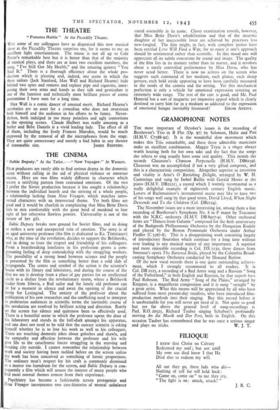GRAMOPHONE NOTES
THE most important of October's issues is the recording of Beethoven's Trio in B Flat (Op. 97) by Solomon, Hoist and Pint (H.M.V. C7588-92). It is the wonderful slow movement which makes this Trio remarkable, and these three admirable musicians make an excellent combination. Maggie Teyte is a singer always worth hearing both for her own sake and the fact that the songs she selects to sing usually have some real quality. This month she records Chausson's Chanson Perpetuelle (H.M.V. DB6t59)• Chausson was an accomplished if not a very gifted composer, and this is a characteristic composition. Altogether superior in invention and vitality is Arne's 0 Ravishing Delight, arranged by W. H. Cummings and sung by Isobel Baillie with Gerald Moore at the piano (H.M.V. DB2i2t), a record which I warmly recommend as a really delightful example of eighteenth century English music. Lovers of Rachmaninov's instrumental music may like to have two of his songs well sung by that good tenor, David Lloyd, When Night Descends and To the Children (Col. DB2i24).
The November issues are a more interesting lot, among them a fine recording of Beethoven's Symphony No. 8 in F major by Toscanini with the N.B.C. orchestra (H.M.V. DB 8957-9). Other orchestral items are "Dances from Galante " composed for the 8oth anniversary of the Budapesth Philharmonic Orchestra by the Hungarian Kodaly and played by the Boston Promenade Orchestra under Arthur Fiedler (C 3367-8). This is a disappointing work consisting largely of introductory flourishes which continue for a long time without ever leading to any musical matter of any importance. A superior and more enjoyable recording is Col. DX 113o, three dances from Smetana's opera The Bartered Bride, played by the Columbia Broad- casting Symphony Orchestra conducted by Howard Barlow.
Of the new vocal records there is one quite outstanding achieve- ment, which I strongly recommend to all readers. It is Col. DB 2125, a recording of a Red Army song and a Russian " Song of the Fatherland," in both English and Russian, by that superb bass Paul Robeson. The Red Army " Song of the Plains," arranged by Knipper, is a magnificent composition and it is sung " straight " by a great artist. What this means will be appreciated by all who have suffered from most present-day vocalists, who have introduced film- production methods into their singing. Buy this record before it is unobtainable for you will never get tired of it. Not quite so good but yet far above the general level of song-recordings is Part. R.O. 2o525, Richard Tauber singing Schubert's profoundly moving An die Musik and Der Post, both in English. On this occasion Tauber has remembered that he was once a serious singer


























 Previous page
Previous page